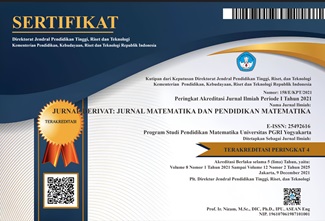Implementasi Media Pembelajaran Dengan Macromedia Flash Untuk Meningkatkan Kemampuan Pemahaman Matematis Mahasiswa
DOI:
https://doi.org/10.31316/j.derivat.v6i1.331Abstract
Abstract
This research aims to find out the improvement of students' understanding of concepts in the basic mathematics subject of relations and functions. This type of research is an experiment, with one group pretest-posttest design research design. The study population was all first-level students of the Primary School Teacher Education Program (PGSD). The determined sample is class I.A as many as 26 students with a purposive sampling technique. Research instruments in the form of UTS questions and tests of students' conceptual understanding. Testing this hypothesis using the t-test. Before conducting a hypothesis test, first test the normality and homogeneity. The student group is divided into three categories, namely high, low, and medium based on UTS results. Furthermore, based on the normalized gain score test obtained an increase in the ability of mathematical understanding for groups of students who have high and medium ability with sufficient criteria. While the group of students who have low ability has an increase with low criteria. Overall the implementation of learning media using Macromedia flash can improve students' mathematical understanding abilities by 0.403, including enough categories
Keywords: Macromedia Flash, Relationships and Functions, Mathematical Understanding
Downloads
Published
Issue
Section
Citation Check
License
Authors who publish with this journal agree to the following terms:
-
Authors retain copyright and grant the journal right of first publication with the work simultaneously licensed under a Creative Commons Attribution-ShareAlike 4.0 International License that allows others to share the work with an acknowledgment of the work's authorship and initial publication in this journal.
- Authors are able to enter into separate, additional contractual arrangements for the non-exclusive distribution of the journal's published version of the work (e.g., post it to an institutional repository or publish it in a book), with an acknowledgment of its initial publication in this journal.
- Authors are permitted and encouraged to post their work online (e.g., in institutional repositories or on their website) prior to and during the submission process, as it can lead to productive exchanges, as well as earlier and greater citation of published work (See The Effect of Open Access).







